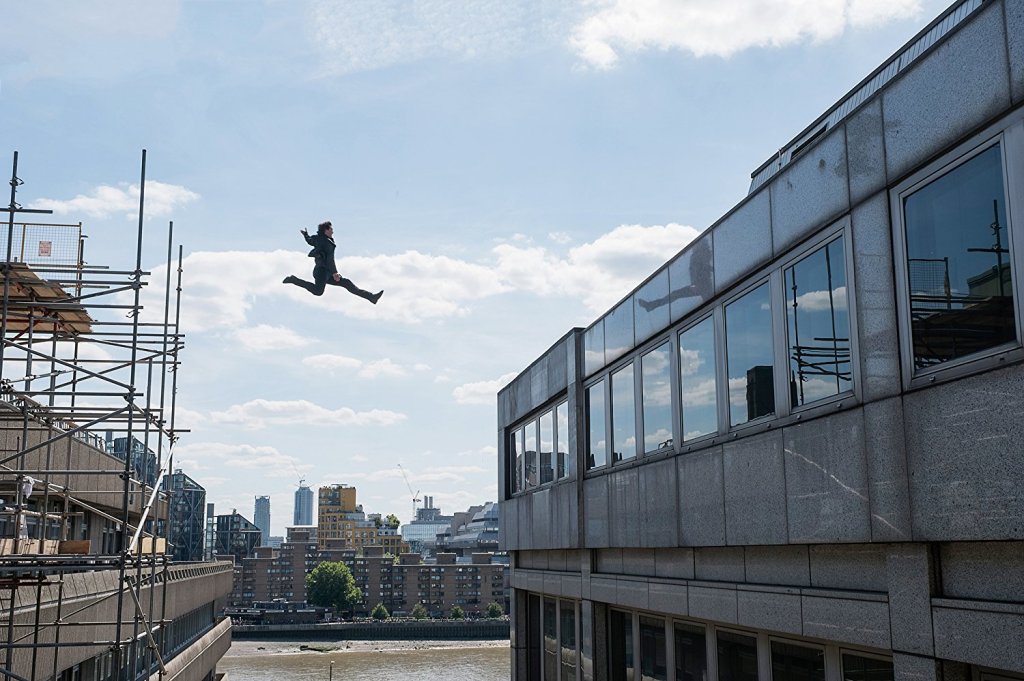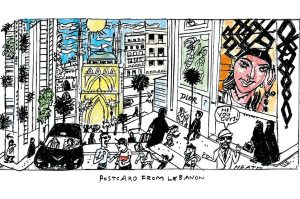Spoilers for Mission Impossible: Fallout below.
The jazz singer and Surrealist connoisseur George Melly once asked Mick Jagger how he had acquired those deep and sinister lines either side of his mouth.
‘Laughing’, Jagger replied.
‘No one laughs that much,’ said Melly. No one except Tom Cruise. It’s part of Cruise’s relentless and tedious professionalism, his insistence on being admired for his work rate. He is the Stakhanov of Hollywood. And he keeps going and going, his face uncannily smooth apart from his mouth, which seems to crumple inwards when he smiles, giving him the mien of an angry hedgehog. If Cruise made a deal with Satan or his agent, it would be of the Dorian Gray kind. That’s why he does his own stunts, to keep his double out of the spotlight.
George Melly’s favourite stunt was to strip naked at parties, get down on all fours, jam his testicles between his thighs so that they bulged out the other side, and then shout, ‘Woof! Woof! I’m a dog!’ I suspect Tom Cruise would do the same if the script or his Scientologist handlers asked him to. My favourite stunt in Mission Impossible: Fallout, the sixth in the series, is the one in which Cruise mistimes a jump between two buildings, and breaks his ankle. This is the only comic moment in a film so bloated, violent and dumb that the only fallout it reminded me of was an anal prolapse.
So, the plot. Ethan Hunt (Cruise) has to track down three ex-Soviet plutonium bombs before an anarchist group called The Apostles, aided by a rogue Norwegian nuclear scientist, detonate them in Rome, Jerusalem and Mecca. Also in the market are a pervy brother and sister team with a Greek surname and London accents; and the rogue MI6 agent Ilsa Faust (Rebecca Ferguson), not to be confused with the rogue MI6 agent Solomon Lane (Sean Harris).
As previously, Hunt’s sidekicks are Benji the spindly Brit (Simon Pegg) and Luther (Ving Rhames), an obese and sentimental African American whose relationship to Cruise’s character resembles that of Clarence Clemons to Bruce Springsteen. Luther is there to tell us that Hunt is the Boss. He is the Uncle Tom of espionage. He is also too fat to run anywhere. This causes numerous continuity errors, as whenever Hunt and Benji sprint off to track down a plutonium bomb, Luther gets left behind, only to be waiting for them at their destination.
Already slowed down by Luther’s smirking porkiness and Benji’s polka-dotted feebleness, Hunt is also shackled to August Walker (Henry Cavill), a mustachioed CIA hit man with an accessorised overnight bag who, should the film work dry up, will never be out of work as a Freddie Mercury impersonator. Walker is there because of a turf war between the head of the CIA (Angela Bassett, underused as usual) and the new IMF Secretary (Alec Baldwin, looking like he’s been hit in the forehead with a hammer). This subplot is the plot’s only concession to reality.
James Bond faced up to his homoerotic masochism in the remake of Casino Royale, admittedly after being tied to a chair naked and repeatedly smashed in the testicles with a knotted rope. Ethan Hunt undergoes no such therapeutic suffering in Mission Impossible: Fallout. Still, Tom Cruise, a heterosexual actor, bravely and sensitively explores the homosexual attraction beneath the inter-agency rivalry of Ethan Hunt and August Walker.
Ethan saves Freddie Mercury’s life when they parachute into Paris from high altitude, after Freddie has trouble with his helmet and loses his oxygen supply. Moments after unzipping their tight flight suits, they’re locked in a bathroom stall with another man, much to the amusement of more conventional users of the facilities. The pair then bust out of the closet—sorry, cubicle—as their new friend returns to consciousness and realises that they’ve violated him while he was knocked out, by scanning his face. Hunt and Freddie Mercury proceed to give their new friend a good pummeling, only for Ilsa Faust to break up the party by shooting him in the head.
This is typical of Christopher McQuarrie’s script and direction. There is no heterosexual love interest, and no kissing either. Like a prostitute who’ll do any stunt but refuses real intimacy, Tom Cruise doesn’t kiss on screen. The women just get in the way, and that’s asking for it. That’s why Hunt has to manhandle the pervy girl and run over Ilsa, and why Ilsa also gets smashed in the face with a log, then punched in the face as the camera angle gives a puncher’s-eye view, and then tied to a chair and gagged. At least James Bond kisses the girls before he makes them die.
Freddie Mercury is jealous, and accuses Hunt of having a ‘secret identity’ with his ‘lady friend’. For a bit, everyone thinks that Hunt is on the down low with The Apostles, but then it turns out that Freddie Mercury is the bad guy. A big chase sequence in London ensues, in locations suitable (the temple of banality that is Tate Modern) and unsuitable (St. Paul’s Cathedral, which was used much more imaginatively in Paddington 2). Hunt ends up hanging from his fingers off the bottom of a service lift and looking up at Freddie Mercury’s crotch through the grille floor. He’s a prisoner of love.
The plot is not so much paper-thin as soggy and smeary like used toilet paper. It turns out that The Apostles want to poison a glacier in Kashmir, in order to contaminate the drinking water in China and India. Off we go to Kashmir, for Ilsa to get beaten up again while lardass Luther defuses the bombs as the timers tick and Hunt and Freddie Mercury duel it out in helicopters. They crash in the mountains. Finally beyond the scope of surveillance, Cruise grapples manfully with his fellow pilot, then kills him.
Our last image is of Hunt is a hospital bed, with sidekick women thanking him for protecting them from the kind of beatings that happen to the women who are his sidekicks. But the lasting image of Mission Impossible: Fallout is its climax in what another genre specialising in violence against women calls the ‘money shot’.
When Freddie Mercury crashes his helicopter, faecal gobs of hot engine oil spurt all over his face. Hunt’s partner is left deformed, undesirable, and quite incapable of a karaoke rendition of ‘Tie Your Mother Down’. The oil is still dripping off his face when Hunt gives him the kiss of death, in this case a boot to the head. Like a performer in some recondite category of pornography, Freddie Mercury looks as if he’s been doused in fresh diarrhoea. Which is exactly how you will feel when you’ve seen this crap film.


















